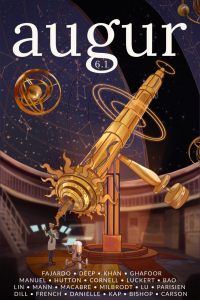The Shutouts by Gabrielle Korn: Review by Abigail Nussbaum
 The Shutouts, Gabrielle Korn (St. Martin’s 978-1-2503-2348-4, $29.00, 304pp, hc) December 2024.
The Shutouts, Gabrielle Korn (St. Martin’s 978-1-2503-2348-4, $29.00, 304pp, hc) December 2024.
As climate change has become an ever-growing and more insistent presence in our lives, it has also begun inflecting and informing works of fiction, whose authors imagine how the remainder of the 21st century will play out. Interestingly, it is writers coming from outside the traditional venues of SFF writing and publishing who have most readily embraced this topic, writing stories and novels about ordinary (though often relatively privileged) people facing the sudden loss of normality in the face of the disruption of natural and social systems.
One topic that recurs in these fictional treatments is the idea of withdrawing into a safe haven: a gated community, a secret hideaway, a bunker. Often these shelters turn out to be the personal playground of a billionaire looking to practice social engineering (not to say eugenics). Invariably, the results are far from utopian.
Gabrielle Korn’s 2023 debut novel, Yours for the Taking, starts with such a premise. As climate catastrophe looms, the governments of the world turn to the wealthy to construct Insides, ruggedized, closed-off regions spanning whole cities into which only a select few will be admitted, and whose running is placed entirely in their funders’ hands. Korn adds another wrinkle, however, when she posits that one effect of climate change-induced collapse is to roll back the advances made in the rights and freedom of women. It is partly in response to this backsliding that the funder of the North American Inside, a female CEO with a bestselling autobiography and a Lean In-type lifestyle brand, decides to populate her safe haven solely with women. Men, she reasons, have been the cause of the world’s problems since time immemorial. Her female-only society, she announces, will breed a new type of human, ready to rule the world with a healing hand.
The awkwardness of the conversations that immediately ensue over the presence of trans and gender-nonconforming people in this space is our first hint that this might not be an entirely robust theory of human behavior. Much of Yours for the Taking is taken up with the exposure of the feminist Inside’s shortcomings and failures. Capitalism, it turns out, trumps feminism, and the supposed saviors of humanity are rigidly controlled with surveillance and drugs. By the end of the novel, the Inside’s leadership has collapsed, and the novel’s protagonists have escaped from it.
Yours for the Taking’s follow-up, The Shutouts, focuses, as its title suggests, on the people left behind when the Insides closed their doors. As the first novel’s heroines, Ava and her daughter Brook, make their hesitant first steps through a transformed and nearly empty wasteland, Ava’s former lover Orchid, who has learned about the Inside’s abuses, races to meet them. Left behind waiting for Orchid is her friend Camilla, who is caring for Max, an escapee from a cult. Thirty years earlier, a woman called Kelly writes letters to the daughter she abandoned, describing her youth as a climate activist and the more radical approaches she embraced as climate collapse became inevitable.
The broader canvas allows Korn to imagine a wider range of responses to the collapse of society as we know it. Max grew up in the Winter Liberation Army, a radical environmentalist organization that practices strict population control – including exposing surplus babies – because their ultimate goal is to return the planet to nature. After their reunion, Ava, Orchid, and Brook take shelter on a former military base whose caretaker has amassed a vast, silent – and, it eventually transpires, incestuous – family around him. Most people, like Camilla and Orchid, eke out an existence in ramshackle shelters, sifting through the detritus of the modern world for means of survival, constantly fleeing north ahead of floods and wildfires.
There’s a certain degree of glibness to these portraits – exacerbated, perhaps, by the realization that this premise of sheltered, gentle people living in bunkers secretly controlled by a corporate elite, while cults and scavengers reign outside, is reminiscent of the Fallout games and TV series. Coincidences abound – Orchid and Ava reunite with ease, Kelly turns out to be connected to both Orchid and Max, Camilla’s sister has a connection to Ava. In a world that is suspiciously empty, suggesting die-offs on an absolutely immense scale, the right people always seem to survive in order to allow this extended clan’s story to come to a satisfying conclusion.
Nevertheless, there are enough compromises and tough choices in these novels to make their heroes’ lives seem anything but charmed. One question that both novels return to is what people are willing to endure in the name of safety. In Yours for the Taking, Ava is pressured into becoming impregnated with Brook by the Inside’s pro-natalist policies. One of the leaders of Kelly’s radical group is a vicious misogynist who argues that feminism is a distraction from the real problem of solving climate change. Max flees the WLA with a friend who was sexually abused by the group’s leader, but after a few weeks of rough living, that same friend chooses to go back. And when Brook is nearly raped by the military base caretaker’s son, he suggests that she might want to endure it in exchange for guaranteed food and shelter.
On a personal level, too, trade-offs between safety and freedom often arise. There are multiple romances in the two novels, but often they make it difficult to distinguish between genuine desire and self-interest. Ava becomes involved with the Inside doctor who has been manipulating her; Max propositions Camilla after weeks of her caring for them. And when safety is achieved in equilibrium with freedom, there still remains the question of whether to hoard it for yourself. Should Ava and Brook stop to help an injured stranger? Should Camilla follow her community north, or stay behind to care for Max, who has broken their leg? Korn’s handling of these questions strikes a persuasive balance between bleakness and hope, eventually leading her characters to a safe haven that feels fully earned.
Abigail Nussbaum is a Hugo Award-winning critic and the author of the blog Asking The Wrong Questions. Her writing has appeared in The Guardian, New Scientist, The Los Angeles Review of Books, and Strange Horizons, among others, and she is a regular contributor to the progressive culture and politics blog, Lawyers, Guns and Money.
This review and more like it in the December 2024 issue of Locus.
 While you are here, please take a moment to support Locus with a one-time or recurring donation. We rely on reader donations to keep the magazine and site going, and would like to keep the site paywall free, but WE NEED YOUR FINANCIAL SUPPORT to continue quality coverage of the science fiction and fantasy field.
While you are here, please take a moment to support Locus with a one-time or recurring donation. We rely on reader donations to keep the magazine and site going, and would like to keep the site paywall free, but WE NEED YOUR FINANCIAL SUPPORT to continue quality coverage of the science fiction and fantasy field.
©Locus Magazine. Copyrighted material may not be republished without permission of LSFF.








